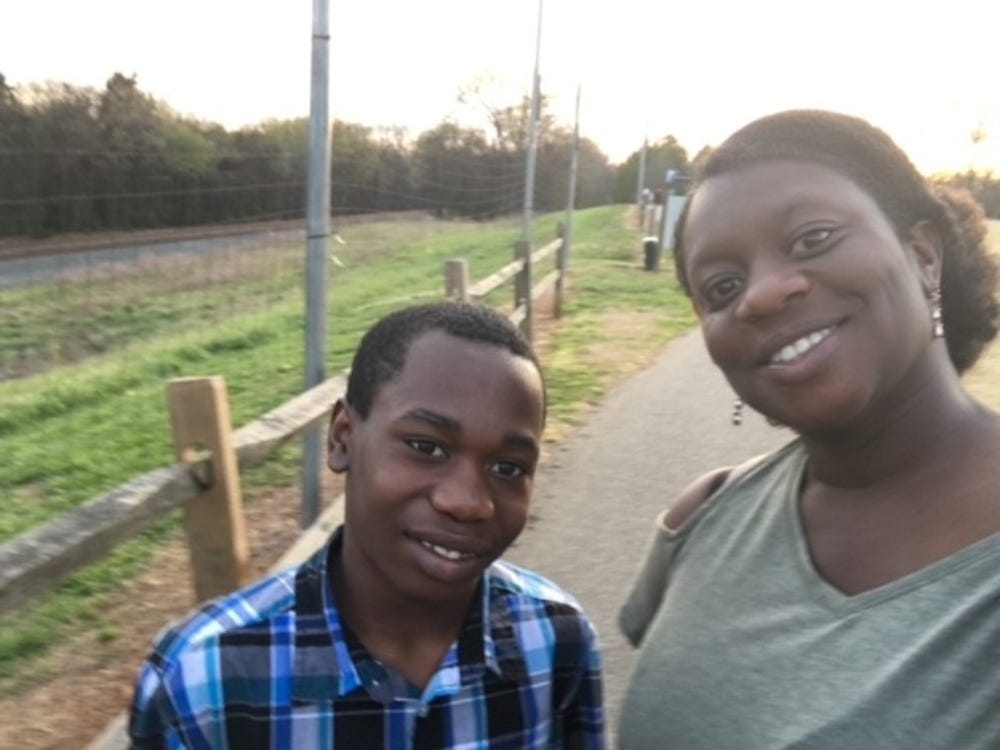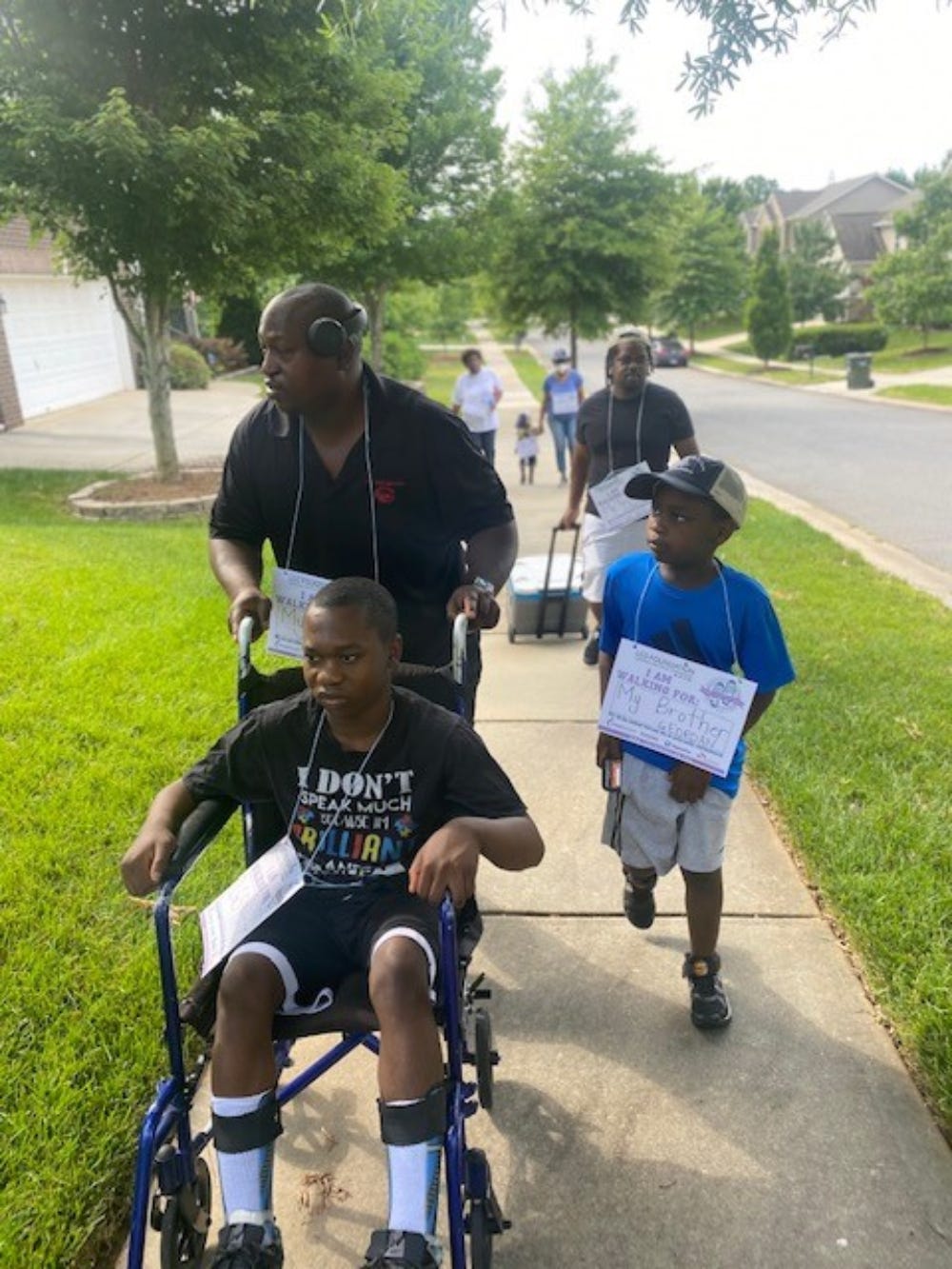Unstoppable: How Crystal Ferguson Has Redefined Success While Navigating Society With Lennox-Gastaut Syndrome (LGS)

Support from your community is necessary to not only increase awareness about rare conditions like LGS, but also to come alongside you when you need a helping hand.
As a part of our “Unstoppable” series, I had the pleasure of interviewing Crystal Ferguson.
Crystal Ferguson, a mom and former teacher, is based in North Carolina with her son Geordan (16) who lives with a rare type of epilepsy, Lennox-Gastaut Syndrome (LGS).
Thank you so much for doing this with us! It is really an honor. Our readers would love to get to know you a bit better. Can you share your “backstory” with us?
I grew up in Winston-Salem, North Carolina, and I later moved to Charlotte, North Carolina to attend college. It was there that I met my husband in 2001, and together we have three sons. One of our sons, Geordan, lives with Lennox-Gastaut Syndrome (LGS), a severe epilepsy syndrome that develops in very young children. LGS is characterized by severe, frequent, and prolonged drug-refractory seizures.1 This means that the seizures do not respond to treatment.
In 2003, I became a teacher. I loved being able to pour myself into the lives of students, and I learned the importance of building teams to support individuals as a member of a school faculty. So, when we had Geordan and learned about LGS, I put that knowledge to work and assembled a team of professionals and friends to help my husband and I make sure Geordan has the support he needs at school and at home.
Back-to-school anxiety is unique for our family because each year requires educating new staff about epilepsy and how to help keep Geordan safe at school, including the importance of on-campus access to a seizure rescue treatment should he start seizing.
Do you feel comfortable sharing with us the story surrounding how you became disabled or became ill? What mental shift did you make to not let that “stop you”?
When Geordan was three years old, he had his first seizure at daycare. I got the call while teaching and my husband and I raced to the hospital. We had no idea this would become so commonplace. Only a couple of months later, Geordan had another seizure.
Finding a medication that worked for Geordan was difficult. He was treated with nearly 20 medications over two years, but nothing worked. When he was five years old, we went to Duke University Hospital. Geordan underwent countless tests and was finally diagnosed with LGS.
For some time, I coped on my own, figuring out Geordan’s doctor appointments, specialist care and treatment without help from outside sources. I believe, to some degree, I was in denial. But the mental shift I made to not let LGS stop us was when I realized that caring for Geordan was going to be a lifetime for us, and outside of his specialists, we needed to invest in a team to surround and support our family throughout this journey.
Can you tell our readers about the accomplishments you have been able to make despite your disability or illness?
Today, my mother and I partner with the LGS Foundation as North Carolina ambassadors. We also raise awareness for LGS through our connection with UCB, a pharmaceutical company focused on the discovery and development of innovative medicines for people living with severe diseases, including LGS and other forms of epilepsy.
For us, it’s about celebrating wins, big and small. For example, Geordan’s speech therapist praising him for the work he was doing and seeing both the therapist and Geordan’s nurse cheering him on as he learned.
What advice would you give to other people who have disabilities or limitations?
As a parent of a child living with LGS, I’ve often felt that I alone am responsible for his care. Learning to reach out to others and rely on their expertise has brought me so much peace when it comes to Geordan’s care. I think it’s so important to remember that you don’t have to do this alone. There are amazing resources out there for people to take advantage of, including resources for rare conditions like LGS.
I find myself utilizing the skills I picked up not only from my teaching career, but also as a mother to aid others living with LGS in their diagnosis and care journeys. I believe it is paramount to educate faculty and staff at your child’s school about their condition and emergency care, including seizure rescue medications, that come with it.
Organizations like the LGS Foundation have the professionals to help you put even the most complicated aspects of your child’s conditions into more simple terms, so that your child can always have an advocate no matter how well-versed they are in the medical world.
None of us are able to achieve success without some help along the way. Is there a particular person who you are grateful towards who helped get you to where you are?
I think when you’re a parent to a child living with LGS, there’s no singular person who has the greatest impact. Rather, I think I’m most grateful to the amazing team that supports Geordan and our family on a daily basis. I’m consistently inspired by the specialists and nurses who provide Geordan with all the help he needs. They are watchful eyes, advocates, and even friends to my entire family. For me, it’s all about providing Geordan with the highest quality of life, and his care team does just that — to them I will be forever grateful.

How have you used your success to bring goodness to the world?
I hadn’t met a parent of a child with LGS until I went to a Patient-Focused Drug Development Conference just 3 years ago, and before then I was relying exclusively on a specialist for advice. I realized that others may be struggling in the same way I was, and there was value in sharing your story and coming alongside others in theirs.
Meeting other parents, coupled with my involvement in the LGS Foundation, has led me to helping others who are living with LGS. By fundraising and being an ambassador for the LGS Foundation in North Carolina as well as spreading awareness through my partnership with UCB, I am able to spread the good news that, while raising a child with LGS may look different, there are ways to ensure your child can have a good quality of life.
Can you share “5 things I wish people understood or knew about people with physical limitations” and why.
- For someone with neurological issues, there are both medical and behavioral aspects related to their care; it’s not always just one or the other.
- When a parent of a child with a disability calls, emails, or sets up meetings with faculty, they’re not trying to inconvenience you, they’re advocating for their child’s health and safety.
- While someone with a neurological issue may have a good day, there’s no guarantee that it will be the same tomorrow — the next day could be entirely different.
- What most people think of as simple life things, like going on vacation, heading over to a friend’s party, or buying a new home, we have to take Geordan’s needs into consideration in every circumstance.
- Support from your community is necessary to not only increase awareness about rare conditions like LGS, but also to come alongside you when you need a helping hand.
Can you please give us your favorite “Life Lesson Quote”?
“One can choose to go back toward safety or forward toward growth. Growth must be chosen again and again; fear must be overcome again and again.” -Abraham Maslow. Sometimes as parents, we can hold ourselves to unrealistic expectations of perfection, and when we don’t meet those expectations, we must make a choice. Caring for a child with a disability presents the opportunity for me to either slink back in fear or overcome it and grow from it, and, as a parent, I know that the best thing I can do for Geordan is choose to grow — everyday.
We are very blessed that some of the biggest names in Business, VC funding, Sports, and Entertainment read this column. Is there a person in the world, or in the US whom you would love to have a private breakfast or lunch with, and why? He or she might just see this 😊
If I had to have a private meeting with just one person, I would choose Harriet Tubman. While she is known for her amazing achievements as an abolitionist, most aren’t aware that she lived with epileptic seizures. I admire that she did not allow this to stop her from fulfilling her immeasurable purpose.
References:
- van Rijckevorsel, K. Treatment of Lennox-Gastaut Syndrome: Overview and recent findings. Neuropsychiatric disease and treatment. https://www.ncbi.nlm.nih.gov/pmc/articles/PMC2646636/. Published December 2008. Accessed August 19, 2022.
Unstoppable: How Crystal Ferguson Has Redefined Success While Navigating Society With… was originally published in Authority Magazine on Medium, where people are continuing the conversation by highlighting and responding to this story.
